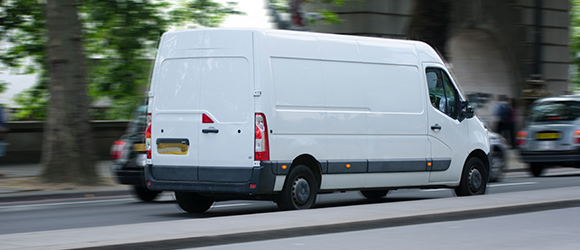Guide to getting the right courier van insurance
03/11/2020by Mark McKenna03/11/2020Guide to getting the right courier van insuranceBluedrop Services

Courier van insurance overview
Following the ever increasing growth of people purchasing online versus in store, it is no surprise that the number of courier van drivers on the road has also risen. Whatever your online purchase; from the larger unwieldy white goods and furniture that are difficult to collect yourself, to smaller items such as clothing and accessories that are simply easier to order online. Courier van drivers are required to get them to you in one piece. As a specialist insurance provider, we aim to provide them with the best value courier van insurance to cover all eventualities.
Getting the right courier van insurance
One of the first challenges to combat is knowing that there are different types of commercial van insurance, and without the help of a specialist insurance provider, many vehicle owners get caught out having purchased the incorrect type of fleet insurance policy whilst focussing on getting the cheapest quote.
The three main contenders are, carriage of own goods, haulage and courier.
‘Carriage of own goods’ is a commercial van insurance policy suitable for tradesmen where the contents of the van belong to them, such a builders, painters, plumbers and electricians.
‘Haulage insurance’ is a form of hire and reward insurance and is typically used for long distance, single load drop offs. When looking to make a claim a couple of drops offs could be considered acceptable by an insurance firm, but having several drops in a small area is regarded by insurance companies as courier van insurance.
‘Courier van insurance’ is another form of hire and reward insurance, but is more typically for multiple load drop offs within a localised area, perhaps to homes or smaller businesses.
As there are different levels of risk associated with each type of insurance, you need to be sure that you are specifically covered for courier van insurance, or you may find that you are unintentionally not covered when you need it most.
How do I know if I need haulage insurance or courier van insurance?
If your delivery vehicle weighs more than 3.5 tonnes you will need HGV haulage insurance. Vans and other vehicles weighing less than this are classed as light goods vehicles (LGVs). It is generally accepted that haulage is for long distance and courier van insurance is for shorter distance, multiple drop offs.
However, the safest option is to check with your insurance provider and make sure you both agree at the point when you take out the cover.
Why is courier van insurance different?
Courier van insurance is required opposed to standard vehicle insurance as courier vans carry different risks to those of standard vehicles such as:
- high millage - increased time on the road increases the potential for accidents
- working to deadlines where the risk of accident can be increased from speeding
- theft of goods whereby valuable items might be targeted
You may be able to reduce the cost of your premiums by taking some obvious precautions such as fitting an alarm and immobiliser, or locking the van away overnight. If your vehicles do limited mileage then you could possibly qualify for a limited millage discount – however if you go over your limit your insurance will be invalid.
You can also use telematics or a vehicle “black box” to help reduce insurance costs as this will evidence good driving behaviour and therefore reduce your premiums. To be extra vigilant, you can also install a dashboard camera to help provide evidence for claims and accidents. Having these additional extras will likely reduce your overall fleet insurance costs.
Can I get coverage for a courier van fleet on one policy?
You can normally find a courier van insurance policy to cover fleets of 3 or more vehicles. The policies can cover a mix of vehicle types and sizes under one policy, so if your fleet includes a combination of motorbikes, cars, vans and trucks, one policy will cover all.
You can also include optional insurance cover with goods in transit and liability insurance to help protect you from the specific extras that come with driving a courier van. If you require additional insurance cover, let your insurance broker know so that they can put together the most suitable and relevant insurance cover for you.
Return to guide menuWant to find out more about Bluedrop's courier insurance?
Industry updates, helpful guides and useful information from our experts.
SubscribeBook your FREE Insurance Review for expert advice tailored to your business
Request Review Privacy and Cookie Policy
Privacy and Cookie Policy  Terms of Business
Terms of Business  Making a Complaint
Making a ComplaintIf you are unhappy with our service we have a complaints procedure, details of which are available on request by contacting us on 01489 222 897 or alternatively by clicking Make a Complaint above.
You may be able to refer a complaint to the Financial Ombudsman Service (FOS) if you are unhappy with how we deal with your complaint. The FOS website is www.financial-ombudsman.org.uk
Bluedrop Services (NW) Limited Company No: 7287668 Registered Office: Unit 4 Flanders Road, 1st Floor West Wing, Royal London Park, Hedge End SO30 2LG.
Bluedrop Services (NW) Limited is authorised and regulated by the Financial Conduct Authority. Registration No. 530244. You can check our registration by contacting the FCA on 0800 111 6768 or by visiting www.fca.org.uk/register.

